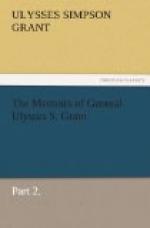My family, all this while, was at the East. It consisted now of a wife and two children. I saw no chance of supporting them on the Pacific coast out of my pay as an army officer. I concluded, therefore, to resign, and in March applied for a leave of absence until the end of the July following, tendering my resignation to take effect at the end of that time. I left the Pacific coast very much attached to it, and with the full expectation of making it my future home. That expectation and that hope remained uppermost in my mind until the Lieutenant-Generalcy bill was introduced into Congress in the winter of 1863-4. The passage of that bill, and my promotion, blasted my last hope of ever becoming a citizen of the further West.
In the late summer of 1854 I rejoined my family, to find in it a son whom I had never seen, born while I was on the Isthmus of Panama. I was now to commence, at the age of thirty-two, a new struggle for our support. My wife had a farm near St. Louis, to which we went, but I had no means to stock it. A house had to be built also. I worked very hard, never losing a day because of bad weather, and accomplished the object in a moderate way. If nothing else could be done I would load a cord of wood on a wagon and take it to the city for sale. I managed to keep along very well until 1858, when I was attacked by fever and ague. I had suffered very severely and for a long time from this disease, while a boy in Ohio. It lasted now over a year, and, while it did not keep me in the house, it did interfere greatly with the amount of work I was able to perform. In the fall of 1858 I sold out my stock, crops and farming utensils at auction, and gave up farming.
In the winter I established a partnership with Harry Boggs, a cousin of Mrs. Grant, in the real estate agency business. I spent that winter at St. Louis myself, but did not take my family into town until the spring. Our business might have become prosperous if I had been able to wait for it to grow. As it was, there was no more than one person could attend to, and not enough to support two families. While a citizen of St. Louis and engaged in the real estate agency business, I was a candidate for the office of county engineer, an office of respectability and emolument which would have been very acceptable to me at that time. The incumbent was appointed by the county court, which consisted of five members. My opponent had the advantage of birth over me (he was a citizen by adoption) and carried off the prize. I now withdrew from the co-partnership with Boggs, and, in May, 1860, removed to Galena, Illinois, and took a clerkship in my father’s store.




